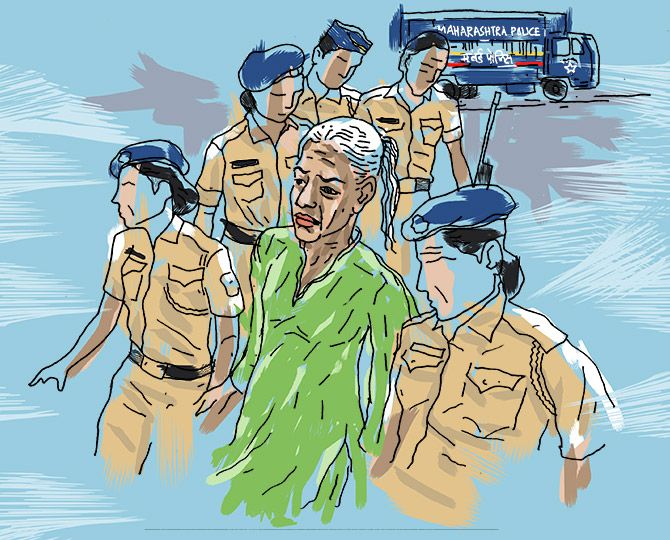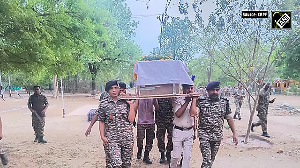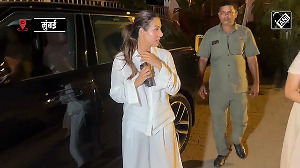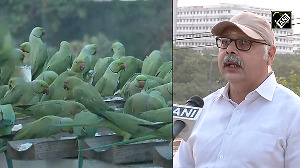'Indrani, will you fight till the last?' a reporter yelled.
'Yes!' she replied strongly.
So concluded a day in court that saw a woman accused of murder don a fresh role of heroine of the moment.
Even Bollywood couldn't have come up with such a curious twist.
Rediff.com's Vaihayasi Pande Daniel reports on a bizarre twist in the Sheena Bora murder trial.
Illustration: Dominic Xavier/Rediff.com

Today they brought a dangerous terrorist to court.
Thirteen policemen/women, some armed with rifles, swiftly hustled the assassin from the dark blue prison bus, through the grey drizzle, to the third floor of the new wing of the sessions court in Kala Ghoda, south Mumbai.
Their speed had nothing to do with rain.
It was hard to identify The Terrorist in this sea of fast-marching khaki, as they approached the building, double pace.
She was wearing monsoon light green. Her name was Indrani Mukerjea.
When you first start making trips to a court to cover a trial, among the umpteen new things you learn, is that most of the people in court are policemen.
Their numbers seem to outdo even that of the black-coated lawyers by probably 2:1.
They are customarily a silent, invisible lot.
Some are watchful and cautious. Occasionally curious.
Others more dutiful. Or Important.
Most yawn lavishly and look bored and indifferent, clutching grossly out-of-date weapons.
Many are young women. They stand apart from the rest, in these halls of justice, isolated, perhaps by choice, in their own new caste of today's India.
Theirs, in this setting, is mainly a dull job of waiting.
The cops' stentorian voices come to life only when they are jostling prisoners from the jail buses to the courts, sometimes with a bit of camaraderie, sometimes unduly harshly, sometimes with handcuffs.
Or when they are herding them back to jail.
Other than those rifles, a senior lead cop might have a pistol in her/his belt.
But when a more risky criminal is brought to court, you note, with a momentary frisson of fear, many AK-47s are suddenly in evidence and there is heavy escort of four to five policemen per prisoner.
Today's escort (13 policemen/women) for Indrani seemed to be a message.
There was a message too, it appeared, in the manner in which they swept her up the stairs and down the court corridors, as they pushed and shoved people out of the way and bristled with aggression, their faces looking like that of a pack of sullen bulldogs.
Suddenly, the same usually unseen police were very noticeable in court today, demonstrating their caste's solidarity.
As Indrani was rushed into the court room, a puzzled journalist, trying to figure who was at the centre of the melee of belligerent policewomen commented: "Is that a terrorist or is that Indrani?!"
Indrani, Accused 1, was in court, without co-accused Peter Mukerjea or Sanjeev Khanna.
Not for the Sheena Bora trial. But to depose evidence in connection with the violent death of a woman prisoner, Manjula Shetye, and the 'uprising' that occurred subsequently at Byculla jail on Mirza Ghalib Road (an odd name for a road that has a jail on it, given the 19th century Urdu poet's peaceable nature) in south central Mumbai.
Gunjan Mangla, Indrani's lawyer moved the court, urgently Tuesday, saying Accused One had been manhandled and threatened in the jail by her guards (guards, though from the police, are quite different from the police escort).
She needed to give evidence of those happenings, show her bruises before they faded and describe what she saw on the tragic day of Manjula's death on Friday, June 23.
Judge J C Jagdale, who had recently taken charge of the case, agreed to have Indrani brought in.
The wellbeing and safety of an undertrial is the direct responsibility of the judge presiding over a CBI trial.
Indrani took an inordinately long time to come from Byculla jail on Wednesday morning.
Maybe the heavy showers, which had cooled the court premises considerably, had something to do with it.
Or traffic, tangled by incessant rain, delayed her.
Meanwhile the courtroom and adjacent areas was filling up rapidly with a huge media turnout, larger than ever before since the trial began.
Curiosity on how Indrani was attempting to take on the system was running high. Maybe some admiration too.
Unlike other less privileged and more unfortunate women prisoners, Indrani had the power to take this issue up. And she was.
Her lawyer said she did have bad bruises from being mistreated in the events that occurred after Shetye's death.
"They looked pretty bad to me," was her verdict.
When Indrani finally showed, with her zealous, angry posse in tow, it was close to 1 pm.
As she reached the first floor, a lawyer stopped her to ask how she was.
"I can hardly walk," she said. To someone else she said, "Still alive."
She looked wan and tired. No make up either. Her face wore a grave but calm expression.
She was seated at the back of the courtroom, with all the cops flanking her, and when the matter came up was called forward.
Lawyer Sudeep Pasbola raised the issue with the judge.
At first, Judge Jagdale seemed fairly reluctant to allow Indrani to depose. He said she should file an FIR and appear before a magistrate.
Pasbola skillfully tried different tacks and arguments before Judge Jagdale changed his mind and agreed to have Indrani take the witness stand.
A deafening hush descended.
All heads and ears craned forward as Indrani, in a clear voice, started giving her account.
She kept it unemotional. Unembellished. Her face bland.
A face, that now two years in prison, had seen so many other sides of life.
Indrani said on the day of Shetye's death she saw the prisoner being pulled along by the prison guards.
A sari had been wrapped around her neck and she was being manhandled using the sari.
She said, without any inflection in her voice, that she was told by others that they had seen Manjula assaulted in her "private parts" with a stick and that she had been taken to the hospital.
When she inquired later from her own guard Bindu (Naikode), who she said allegedly participated in the beating up of Manjula, she was told that the convict was stable.
But ten minutes later she heard from other fellow prisoners that she was already dead.
Shetye had served 14 years for the murder of her sister-in-law and was allegedly battered over a squabble about a shortage of eggs and pao (bread) in the jail morning rations.
As she spoke about the grim circumstances surrounding Manjula's death, the judge kept firmly steering her away from that and requested her to only describe what was happening to her.
Indrani said that she, along with others, demanded that a judge or the media should hear their account of what happened to Manjula and in the jail that day and subsequently, and that she wanted to be a witness.
She went on to highlight the events of Sunday evening.
She said the jail superintendent started "constructing a lathi charge" on them for protesting Manjula's death and for wanting a hearing.
"They turned off all the lights," she described.
The attack, Indrani said, was lead by the superintendent and that strangely some men were also brought into the prison.
Judge Jagdale heard her solemnly, without interruption.
She said they were beaten up with lathis and she said she had received nasty bruises on her arms and a worse one on her leg.
Indrani asserted that the superintendent threatened her in Hindi using "profane language" and said if she offered evidence as a witness against her "hum tum ko dekhlenge."
She said they told her that what happened to Shetye would happen to her.
Since she had been injured Indrani requested the jail authorities for medical attention. But all of Monday, which was Eid, she specified, Indrani declared she was ignored and they were all locked into their barracks; Indrani is housed in Barrack 2 upstairs, she said.
Instead of taking her to the J J Hospital, three doctors finally came to see her.
She said threats went on and were conveyed to her continuously in jail.
"They don't want me to do a 164 (Section 164 in The Indian Evidence Act, 1872) which is why they are threatening me. I am not going to back out of my 164," she announced.
Finally, she said got a message through to her lawyer Mangla and that was how she was in court.
Judge Jagdale heard her account carefully and dictated, in his habitually excellent diction, an order that Indrani be taken right then to the Nagpada police station to give a statement and that she also be examined medically.
Eight women policeman bundled Indrani out of the courtroom to the benches in the corridor, as they awaited someone from the jail to take her to Nagpada.
The media was kept strictly at bay by the same fierce cops as Indrani sat talking to lawyers Pasbola and Mangla.
It was quite evident that these policewomen were resolute that not an iota of extra information about the events of the last few days at Byculla jail should reach the media, a backlash perhaps of Indrani requesting media scrutiny/intervention that day in jail.
A senior policewoman, with a peaked hat and pistol, was handling the coordination of a transfer to the police station.
She spoke to her superior on her cell phone and then checked the details of the judge's order with the court clerk.
Finally, Indrani was lead quickly down to the bus, presumably towards the Nagpada police station.
The media closed in on Indrani as she departed, hopefully shouting questions. And the police shooed them away roughly.
"Indrani, will you fight till the last?" a reporter yelled, to Indrani on floor three, as she was sped down six flights of steps.
"Yes!" she replied strongly, from floor one.
So concluded a day in court that saw a woman accused of murder don a fresh role of heroine of the moment.
Even Bollywood couldn't have come up with such a curious twist.
EARLIER IN THE TRIAL...
- Seasons change, but nothing really moves in the Sheena Bora trial
- And so the Sheena Bora murder trial gets a new twist
- How did Indrani get the hair dye?
- Indrani's charm has not deserted her
- And Indrani Mukerjea sat there, alone...
- And Peter Mukerjea went hungry...
- Indrani, Peter, Sanjeev: A morning at the Sheena Bora trial











